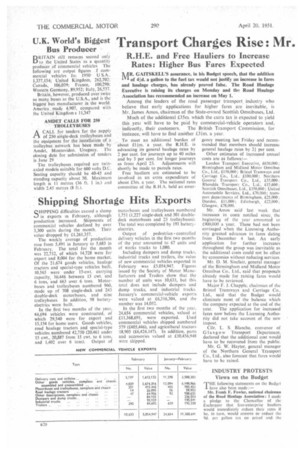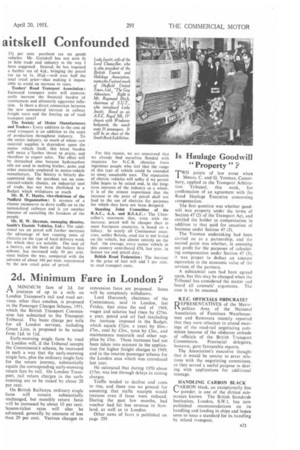Transport Charges Rise: Mr. aitskell Confounded
Page 54

Page 55

If you've noticed an error in this article please click here to report it so we can fix it.
R.H.E. and Free Hauliers to Increase Rates: Higher Bus Fares Expected
NAR. GA1TSKELL'S assurance, in his Budget speech, that the addition "I of 41-d. a gallon to the fuel tax would not justify an increase in fares and haulage charges, has already proved false. The Road Haulage Executive is raising its charges on Monday and the Road Haulage Association has recommended an increase on May 1.
Among the leaders of the road passenger transport industry who believe that early applications for higher fares are inevitable, is Mr. James Amos, chairman of the State-owned Scottish Omnibuses, Ltd.
Much of the additional £35m. which the extra tax is expected to yield this year will have to be paid by commercial-vehicle operators and, indirectly, their customers. The British Transport Commission, for instance, will have to find another 1:31m. a year.
To meet an additional burden of about film, a year, the R.H.E. is advancing its general haulage rates by 2 per cent. for journeys up to 40 miles and by 3 per cent. for longer journeys
as from April 23. Adjustments will shortly be made to parcels rates.
Free hauliers are estimated to be involved in an extra expenditure of about £3m. a year. The national rates committee of the R.H.A. held an emer gency meeting last Friday and recommended that members should increase general haulage rates by 21 per cent. Other estimates of increased annual costs are as follows London Transport Executive, £630,000; Birmingham and Midland Motor Omnibus Co., Ltd., £150,000; Bristol Tramways and Carriage Co., Ltd.. £100,000; Northern General Transport Co., Ltd., £35,000; Rhondda Transport Co., Ltd., £11,600; Scottish Omnibuses, Ltd., 1350,000; United Automobile Services, Ltd., £70,000; transport departments of Birmingham, £25,000; Dundee, 111.000; Edinburgh, £22,000; Glasgow, £78,000.
Mr. Amos said last week that increases in costs notified since the beginning of the year amounted to £.900,000 a year. These had not been envisaged when the Licensing Authority granted advances in fares dating from December 4 last. An early application for further increases throughout the group was inevitable as the additional costs could not be offset by economies without reducing services.
Mr. D. M. Sinclair, general manager of the Birmingham and Midland Motor Omnibus Co., Ltd., said that proposals already made for raising fares would have to be reviewed.
Major F. I. Chapple, chairman of the Bristol Tramways and Carriage Co., Ltd., said that the Budget would eliminate most of the balance which the company expected at the end of the year. The application for increased fares now before the Licensing Authority did not take account of the new i mpost.
air. L. S. Blanche, convenor of Glasgow Transport Department, declared that the additional cost would have to be recovered from the public.
Mr. G. W. Hayter, general manager of the Northern General Transport Co., Ltd., also forecast that fares would have to be raised.
INDUSTRY PROTESTS Views on the Budget
THE following statements on the Budget have also been made:
Mr, Frank F. Fowler, national chaimtau of the Road Haulage Association : I made a pledge to the Chancellor of the Exchequer that free-enterprise hauliers would immediately reduce their rates if he, in turn, would remove or reduce the 9d. per gallon tax on petrol and. the 331 per cent. purchase tax on goods vehicles. Mr. Gaitskell has not seen fit to help trade and industry in the way I have suggested. Instead, he has imposed a further tax of 41d., bringing the petrol tax up to Is. 101d.—well over half the total retail price—thus making it impossible to avoid an increase in rates.
Traders' Road Transport Associalion: Increased transport costs will unnecessarily increase the financial burden of rearmament and ultimately aggravate inflation. Is there a direct connection between the new announced increase in railway freight rates and the forcing up of road transport costs?
The Society of Motor Manufacturers and Traders: Every addition to the cost of road transport is an addition to the costs
of production throughout industry. To the motor industry, so much of whose raw material supplies is dependent upon the motor vehicle itself, this latest burden will mean a'further threat to prices, and therefore to export sales. The effect will be intensified also because hydrocarbon oils are used in making leather, paint and other materials employed in motor-vehicle manufacture. The Society is bitterly disappointed that the purchase tax on commercial-vehicle chassis, an industrial tool of trade, has not been abolished in a Budget which withdraws so much
Mr. R. F. Hanks, vice-chairman of the Nuffield Organization: It savours of a clumsy manoeuvre to drive traffic on to the nationalized railways and is yet another instance of curtailing the freedom of the people.
Mr. H. W. Heyman, managing director, Smith's Electric Vehicles, Ltd.: The additional tax on petrol still further increases the advantage of low running costs of electrics on the type of local delivery work for which they are suitable. Thc cost of a battery, on the basis of the battery hire scheme, has increased only 50 per cent. since before the war, compared with the advance of about 140 per tent, represented by the new retail price of petrol. For this reason, we are concerned that we already find ourselves flooded with inquiries for N.C.B. electries from ingenious people who feel that the range of this type of vehicle could be extended to many unsuitable uses. The reputation of electric vehicles will suffer if we permit false hopes to be raised and, in the longterm interests of the industry as a whole. it is of the utmost importance that the increase in the price of petrol shall not lead to the use of clectrics for purposes for which they have not been designed.
Standing Joint Committee of the R.A.C., A.A. and R.S.A.C.: The Chancellor's statement that, even with the increase, petrol will be cheaper than in most European countries, is based on a fallacy. In nearly all Continental countries, unlike Britain, road tax is not levied on the vehicle, but almost entirely on the fuel. On average, every motor vehicle in this country contributed £30, last year. in licence tax and petrol duty.
British Road Federation: The increase in the price of fuel will add 5 per cent. to road transport costs.








































































































































































































